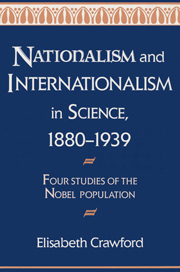Book contents
- Frontmatter
- Contents
- List of tables and figures
- Acknowledgment
- Introduction
- PART I CONCEPTUAL AND HISTORIOGRAPHICAL ISSUES
- 1 Methods for a social history of scientific development
- 2 First the nation: national and international science, 1880–1914
- PART II CRITICAL AND EMPIRICAL STUDIES
- Bibliographical essay
- Index
2 - First the nation: national and international science, 1880–1914
Published online by Cambridge University Press: 06 November 2009
- Frontmatter
- Contents
- List of tables and figures
- Acknowledgment
- Introduction
- PART I CONCEPTUAL AND HISTORIOGRAPHICAL ISSUES
- 1 Methods for a social history of scientific development
- 2 First the nation: national and international science, 1880–1914
- PART II CRITICAL AND EMPIRICAL STUDIES
- Bibliographical essay
- Index
Summary
The general terms nationalism and internationalism carry so many meanings that it is necessary to try to specify these before applying the terms to the sciences. Of the two, the terminology surrounding nationalism is the more perplexing; in the words of one author, it is ”a phenomenon so Protean in its manifestations as to defy precise definition.“ In common language, the term is most often taken to mean the waving of flags to solidify sentiments of national allegiance and to mobilize against foreigners. This form of nationalism is most closely associated with the period 1880 to 1914, not only because it was then that many nationalist movements came into being and spread throughout Europe, but also because this was the great time of nationalist doctrine. As both the movement and the doctrine gained currency, they bred the more virulent form of nationalism that came to be known as chauvinism. It is in this flag-waving, rabble-rousing sense that nationalism in the sciences has most often been described - and decried. The term can be given another sense, though, one that does not refer to doctrine or movement, but to nationalism as a phenomenon inherent in certain sociopolitical conditions. As defined by Ernest Gellner, who has propounded this alternative view: “Nationalism is primarily a political principle, which holds that the political and the national unit should be congruent.” This definition seems to fit best the development of national science enterprises in the late nineteenth century and the types of nationalism among scientists that accompanied them. It will receive more attention presently.
- Type
- Chapter
- Information
- Nationalism and Internationalism in Science, 1880–1939Four Studies of the Nobel Population, pp. 28 - 46Publisher: Cambridge University PressPrint publication year: 1992
- 3
- Cited by

